-
Making Your Pool Safe for Diving
These days, many pool owners have decided to eliminate the diving board entirely. This is primarily due to safety concerns, although some people choose to avoid diving boards for aesthetic reasons. Diving can still be a thrilling part of the home pool experience, however, as long as you inform the swimming pool builder in Salt Lake City that you intend to use it for this purpose. Your pool contractor will discuss applicable safety codes with you to ensure your pool meets the safety standards.
Pool Length and Width
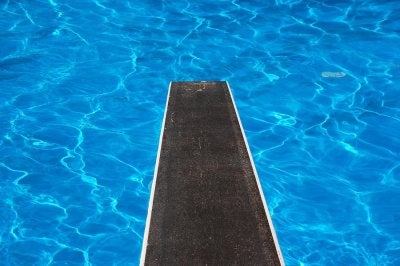
A pool will only be safe to dive in if it meets the minimum length and width standards. The American National Standard for Residential In-Ground Swimming Pools requires that all home pools with a diving board be at least 16 feet wide and 32 feet long.
Pool Depth
Depth is a crucial consideration for diving pools. At the deep end where the diving board will be installed, the pool must have a hopper that is at least eight feet deep. The hopper is the deepest part of the pool. However, competitive divers should ideally have a deeper pool for safety. Your pool contractor will let you know what the maximum depth available is.
Wall Slopes
Slope is another significant safety consideration. The code for residential pools prohibits wall slopes greater than a 1:5 slope ratio to a transition point. This transition point shouldn’t be any less than two feet, nine inches beneath the waterline.
Diving Boards
The diving board you select depends in part on the type of pool you have. If you have a saltwater pool, you’ll need a diving board that is capable of resisting rust. It’s possible to have a board as long as 10 feet if your pool is large and deep enough, but generally, only competitive divers would select a board this long. Most pool owners install a six-foot or eight-foot diving board, depending on the size of the pool.
Safety Rules
Your swimming pool builders can make your diving pool as safe as possible, but a good design and solid construction don’t override the need for consistently enforced safety rules. Divers should only jump off the end of the board, not the side, and no horseplay should be tolerated on or near the diving equipment. Children should have adult supervision at all times, and no one should swim or dive without a buddy present.
-
Swimming Pool Maintenance FAQs
Becoming a new pool owner is exciting. Dealing with daily pool maintenance is somewhat less thrilling. When you imagined having your own pool at home, you probably thought about how nice it would be to relax on a float on a hot day, get more exercise swimming laps, and give the kids a place to play outdoors. Weekly shock treatments and daily debris skimming probably wasn’t part of your daydream. But, the good news is that you don’t have to manage it all by yourself. A pool contractor in Salt Lake City will give you all the information you need to make decisions about your professional maintenance schedule.
What’s the easiest way to stay on top of pool maintenance?

The easiest, hassle-free way to keep your pool at optimum conditions is to hire a swimming pool company to handle your maintenance tasks for you. Even if you do schedule regular services, you’ll probably want to handle a few minor tasks yourself. Create a written maintenance schedule, which might look something like this:
- Skim debris daily
- Vacuum once weekly
- Run the pump 10 to 12 hours daily
- Chemically treat twice weekly
- Shock once weekly
- Do safety checks of equipment every other month
Of course, your own maintenance list won’t replace professional services, as these are only some of the tasks that need to be done regularly.
How can I balance the calcium hardness?
Hard water makes your pool cloudy and can cause sediment to accumulate inside the plumbing. Water that’s too soft is corrosive. Eventually, it can corrode the metal and crumble the concrete. Ideally, you should keep the calcium hardness at about the middle of the 150 to 400 ppm range. Check the level every one to two weeks. Raise the level simply by adding calcium chloride. Lower the level by draining and replacing some of the water, or by using a flocculant. A flocculant will clump the extra calcium, and you can then remove it by cleaning the walls and bottom of the pool, and then backwashing and cleaning the filter.
How can I keep ducks out of my pool?
Ducks are certainly cute, but they’re also messy, and letting them use your pool will make your pool maintenance tasks more of a headache. Perhaps the least expensive way to duck-proof your lap pool is to introduce some of their natural predators. Find pool floats that mimic the size and appearance of alligators, snakes, dolphins, or killer whales. Leave the floats in the water whenever you aren’t swimming.
-
Simple Ways to Keep Your Hot Tub in Good Condition
After you perform a new hot tub installation on your property, you will be in charge of routinely maintaining your spa. In this video, you will learn some essential tips and tricks that will help you to maintain your hot tub installation over time. A company that offers swimming pool services in Salt Lake City can provide you with the chemicals that are needed to balance the water in your hot tub and eliminate harmful bacteria.
If you have been dreaming of a new hot tub installation for your property, now is a great time to schedule your project. With services from a company that sells hot tubs in your local area, you can set up a cozy spa that is ready to help you relax.
-
What Are the Safety Benefits of Keeping Your Pool Covered?
Pool covers provide safety and protection for backyard swimming pools. If you are gearing up for a new pool installation near Salt Lake City, be sure to talk to your swimming pool builders about the possibility of ordering a custom cover for your pool. By including a cover in your pool installation, you will have the peace of mind that comes from knowing that your pool area will be a safe space for your entire family.
There are a few safety benefits to keeping your pool covered when it is not in use. With its strong and durable construction, a pool cover will be able to prevent accidental slips and falls into the swimming pool. Pool covers also prevent young children from entering pools without the presence of a supervising adult. When you cover up your pool between swimming sessions, you can also help to prevent dangerous debris and bacteria from contaminating your pool water.
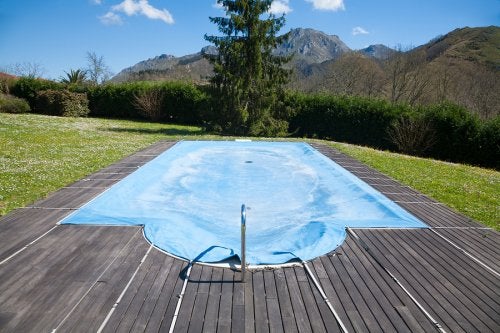
-
What to Consider When Choosing the Right Depth for Your Pool
During a swimming pool installation, you will need to consider both the function and style of your new pool. Your pool contractor will work closely with you to help you create a new swimming pool that meets your needs for recreation and relaxation. When you are gearing up for a swimming pool installation serving Salt Lake City , you will need to work with your swimming pool company to find a pool depth that is right for your lifestyle and needs. Let’s review some essential factors to consider when you are choosing the right depth for your new pool.
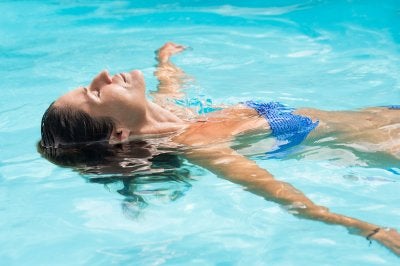
Think About Your Lifestyle
As you are choosing a depth for your swimming pool, you will need to take your lifestyle and preferred hobbies into consideration. If you plan on only using your pool to swim laps, you may want to build a shallow pool that is a standard four or five feet in depth. When you intend on using your pool for diving or other types of recreation, you may need to create an end that is up to six feet in depth.
Consider the Safety of Your Family
Safety is of the utmost importance when you are planning a new pool installation. If you are raising young children, a very deep pool may pose a safety threat to young swimmers. Additionally, it is important to make sure that the shallow end of the pool is a safe depth for the shortest members of your family. A person should be able to safely stand in at least one part of the pool area.
Evaluate Your Pool Maintenance Requirements
A very deep pool may ultimately prove to be more difficult to maintain than a shallower swimming space. When you make your pool deep enough for diving, you will increase the surface area of the tile or pool liner. Other accessories that come with a deep pool, such as diving boards, will also require additional maintenance.
-
A Step-by-Step Guide to Hot Tub Installation
A new hot tub will provide you and your family members with the perfect place to relax and unwind at the end of a long day. If you are preparing for a hot tub installation near Salt Lake City, make sure to hire a qualified pool contractor to assist you with your project. From choosing the site for your hot tub to connecting the electrical wiring, your contractor will provide you with many essential services. Here is a step-by-step guide to what you can expect from the hot tub installation process.
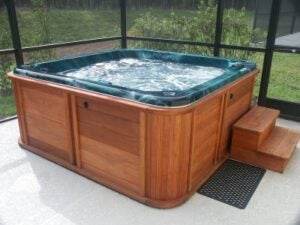
Find the Best Site
The first step of a hot tub installation is to find a site that is appropriate for your new unit. Depending on the building codes in your city, you may need to place your hot tub at a certain distance away from the exterior of your home. Along with considering building code, you will also need to find an area that will allow you to conveniently access your hot tub.
Schedule the Delivery
After you have chosen the appropriate site for your hot tub and picked out a hot tub model that includes all of your favorite features, you will be ready to schedule a delivery with your contractor. In order to safely deliver your hot tub, your contractor will need to be able to safely reach the installation area. You may need to temporarily trim back trees or remove fence panels in order to successfully accomplish the delivery.
Connect the Electrical Wiring
During the final phase of your installation, your contractor will need to connect your hot tub to your home’s electrical grid. Your hot tub will require electricity to power its jets, lights, and other features. Since wiring a hot tub requires specialized knowledge and tools, you will typically want to leave this step up to your licensed hot tub installation contractor. Once the wiring is in place, you will be ready to start enjoying your new spa.
-
Why Outdoor Fire Pits Are Hot with Homeowners
You’ve got your new pool installation to enjoy, but it feels like you could use something else to give your space a real “wow” factor. In this case, an outdoor fire pit near Salt Lake City might be the perfect addition to fill in the space and create an enjoyable and relaxing atmosphere. Homeowners all over the country are adding outdoor fire pits to their properties, thanks to the numerous advantages that they bring. They’re aesthetic, they’re practical, and they’re affordable if you work with the right team. Read ahead to find out exactly why outdoor fire pits are hot with homeowners.
It’s nice to be able to hang out in your backyard with your friends, family, and neighbors, but when the sun goes down, you might end up turning in. If you want to keep the socialization going, an outdoor fire pit may be a great option for you. This kind of addition will keep you warm, give you something to gather around, and improve the atmosphere at the same time. Furthermore, an outdoor fire pit can make your home more valuable, reduce your energy bills, and keep the smell of smoke out of your house.
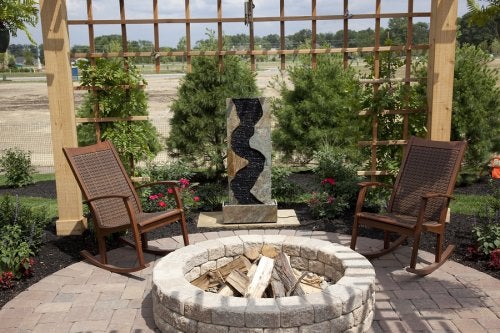
-
Top Reasons You Need a Swimming Pool Cover
Maintenance is essential if you want to keep your swimming pool installation serving Salt Lake City in top shape, but what do you do about the offseason? Big and small pools can both benefit from a pool cover, which can lower maintenance requirements and keep your family and pets safe during the colder months. A pool cover can even help maintain the amount of water in your pool, which protects the environment and saves you some hassle when you open your pool again during the summer. Here is a closer look at the top reasons you need a swimming pool cover.
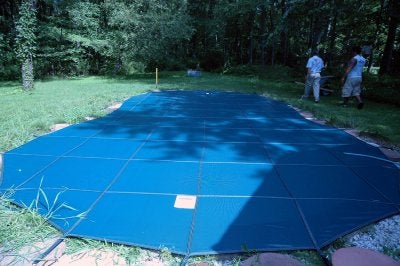
Cut Down on Maintenance Needs
Swimming pool maintenance tends to be a simple enough process, but why not make it even easier? It’s one thing to skim your pool during the summer, but it’s probably not something you’d want to be doing during the winter. When you use a pool cover, you won’t have to worry about removing bugs, leaves, or other debris from the water. This means your list of chores will be one bullet point shorter when the weather gets colder. If you don’t want to skim your pool all year long, consider using a pool cover to shield the water.
Protect Your Family
Just because the weather cooled down, it doesn’t mean your pool will automatically freeze over. You might stop paying so much attention to your pool area when you’re not using it, but your kids and pets might have a different idea. Although all pool areas should be enclosed or protected in some way, kids and pets tend to make their way into the prohibited zone regardless. A pool cover helps to keep your family safe. Even if your kids or pets do make it into the pool area, the cover will prevent them from falling in.
Preserve Your Water
If you don’t want to have to deal with completely refilling your pool when the summer rolls back around again, a pool cover can help. It will prevent your water from becoming contaminated, and it will also retain water that might otherwise evaporate on warmer days.
-
Keeping Your Fiberglass Pool in Top Condition
Fiberglass pools near Salt Lake City bring quite a bit to the table, but it’s up to you to make sure they last for as long as they can. Avoid using harsh chemicals when cleaning, invest in a pool cover to keep it protected during the offseason, and call a pool contractor for regular maintenance and repairs. All it takes to make the most of your pool is a little bit of maintenance, foresight, and planning, so continue reading for tips.
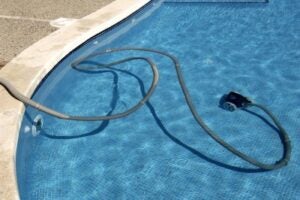
Clean with the Right Products
As simple as swimming pool maintenance can be, doing it without any research can make the whole process much more complicated. You need to clean your pool regularly, but you also need to make sure you’re using the right cleaners. You might think that harsh cleaners do a better job, but they can have a negative impact on your fiberglass pool. The wrong kind of cleaner might damage your fiberglass and scratch the walls of your pool, requiring costly repairs that could have been avoided. Use gentler cleaners for swimming pool maintenance, and remember to skim leaves and debris from your water on a routine basis.
Use a Pool Cover
Although there are some regions where you can keep your pool open all year long, the rest of the world deals with different circumstances. When the last pool day of the year is in the rearview mirror, close your pool up with a cover. Pool covers keep things like bugs, leaves, and bird droppings out of your water and off your pool walls. If you cover up your pool at the end of the season, you’ll have less maintenance to deal with when you open it up again.
Hire Pool Maintenance Professionals
Many homeowners diligently care for their pools throughout the year, but they might still run into questions. When you work with a team of swimming pool maintenance professionals, you can have all those questions answered immediately. They’ll also take care of the process for you, so you won’t even have to lift a finger if you don’t want to.
-
Using Pool Test Strips
Your indoor swimming pool near Salt Lake City relies on a delicate balance of chemicals that will keep the water clean, healthy, and comfortable for swimming. Once you’ve finished up the pool installation process, you’ll need to be able to tell how balanced the chemicals in your water are. Watch this video for some tips on using pool test strips.
Part of swimming pool maintenance is testing the chemical levels to make sure they’re in balance. You can do this using pool test strips. Your test strip will have a couple of readers for different chemicals, and you can match them up against the chart on the back of the container to see if they are in the safe range. Dip your entire test strip under the water for a couple of seconds, compare it to the chart, and then adjust your levels accordingly to enjoy a safe, healthy, and clean pool.
RECENT POSTS
categories
- Uncategorized
- Hot Tub Installation
- Swimming Pool Installations
- Swimming Pool Design
- In Ground Pools
- Swimming Pool Maintenance
- Swimming Pool Service
- Swimming Pool Repair
- Outdoor Fireplace
- Outdoor Fire Pit
- Pool Safety
- Deep Blue Pools and Spas
- Exercise
- Swimming
- Outdoor Kitchen
- Pool Chemicals
- Chlorine Levels
- Water Feature
- Burning Calories
- Pool Contractor
